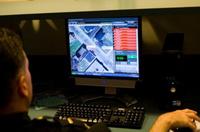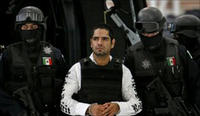-
DHS "pre-crime" detectors draw criticism
A plan by DHS officials to use automated machines to identify people before they commit a criminal or terrorist act is drawing sharp criticism from privacy advocates; DHS is currently developing intention detectors under the Future Attributer Screening Technology (FAST) program; the FAST security checkpoints are outfitted with a sophisticated suite of sensors that are designed to identify several physiological indicators like heart rate or the steadiness of a person’s gaze
-
-
CrimeView Dashboard helps fight crime in real-time
In an effort to share information in an easily manageable format, the Chesapeake Police Department in Virginia recently implemented the CrimeView Dashboard; CrimeView is a cloud-based software system that allows an entire agency to monitor criminal activity in real-time with maps, charts, and reports
-
-
Hi-tech bus helps catch drunk drivers
With the help of a new $350,000 Breath Alcohol Testing (BAT) bus, police in Lafayette, Louisiana are cracking down on drunk drivers; with the BAT bus, officers have access to five computer stations, three breathalyzers, and a yellow line on the floor for suspected drunk drivers to walk along
-
-
Virginia police go 3D
AREVA, an international nuclear services firm, provided the Central Virginia Crash Team with two 3D scanners that use lasers to reconstruct traffic crashes as well as crime scenes to create accurate, scale models as evidence
-
-
FBI completes new information sharing system
Late last month the FBI completed work on its newest information sharing database that will allow local, state, regional, and other law enforcement agencies across the United States to pool information; with the National Data Exchange (N-Dex), local investigators can now pull up records like incident reports, criminal incarceration records, and similar investigations from across the United States
-
-
Man purchases FBI, CIA, and Chicago police badges online
Last month a man was arrested after airport screeners at Chicago’s O’Hare International Airport found a Chicago police badge in his baggage; a search of the man’s apartment revealed that he had obtained more than fifty federal, state, and local law enforcement badges from agencies including the Illinois state police, the FBI, the CIA, and the Cook County Sheriff’s Department.
-
-
Virginia Tech lockdown ends, no gunman found

In an attempt to avoid a repeat of the 2007 mass shooting which left thirty-two people dead, officials at Virginia Tech locked down its campus yesterday after receiving a report of a suspicious man who may have been armed; after an exhaustive search by local police that did not yield any results, authorities decided to lift the lockdown
-
-
Researchers show how to unlock, start a car remotely
Two researchers at the Black Hat event in Las Vegas demonstrated they could send commands from a laptop to unlock the doors of a Subaru Outback — and then start the car; they said that in addition to vehicles, many other GPS-tracking devices, 3G security cameras, urban traffic control systems, SCADA sensors, and home controls and systems are also telephony-enabled and, as a result, susceptible to attack
-
-
DHS slow to crack down on ammonium nitrate sales

U.S. lawmakers are becoming frustrated with DHS for its slow implementation of regulations on ammonium nitrate fertilizer, a key ingredient in dangerous homemade explosives like the one used in the deadly 1995 Oklahoma City bombing; Congress initially passed legislation tightening control on the sale of the fertilizer in 2008, but DHS has yet to implement such regulations and three years later is only now publishing a set of “proposed” rule
-
-
Thales’s Liberty LMR completes Department of Interior tests

Thales’s Liberty LMR has passed U.S. Department of Interior tests; the radio had earlier been approved for Law Enforcement and Tiers 1, 2, and 3; the company says the Liberty LMR, a software-defined radio solution, enables interoperability across all public safety bands, linking government agencies and first responders with a single portable radio
-
-
Solving cold case by recovering old fingerprints
Researchers are developing a novel method for recovering old fingerprints using gold-antibody nanoparticles; the new fingerprinting method that could make it possible to recover previously unusable or undetected prints from old evidence and from surfaces long considered too difficult by crime scene investigators
-
-
Listening to the sound of bullets

ShotSpotter systems relies on a system of acoustic sensors to identify the location from which a shot has been fired; the alerts are immediately conveyed to police dispatchers, 911 operators, and sometimes to officers in the field via laptops in patrol cars; the system includes a computer program which displays a comprehensive bird’s-eye view of the area, marking the location of the incident with a red dot and indicating the time and number of rounds fired
-
-
Foreign sham marriage ring broken up
Last week fourteen people were charged with conspiracy to commit marriage fraud in an attempt to secure citizenship in the United States; the plan involved paying U.S. citizens to enter into false marriages with foreigners from Eastern Europe and Russia to legalize their immigration status; the U.S. recruits were offered as much as $5,000 to participate in the scheme
-
-
Mexican drug cartel enforcer admits to killing 1,500

Mexican police in has arrested a drug cartel leader they say has admitted to ordering the murder of 1,500 people; Jose Antonio Acosta Hernandez, 33, known as “El Diego,” was the head of La Linea, a gang of hit men and corrupt police officers who acted as the armed wing of the Juarez drug cartel
-
-
FBI approves Neurotechnology's latest biometric algorithms
Last week Neurotechnology, a developer of sophisticated biometric identification solutions, announced that two of its newest fingerprint compression algorithms received WSQ Certification; the certification means that the FBI has verified that these two algorithms meet the accuracy requirements in its latest standard for exchange of fingerprint images within the biometrics and law enforcement community
-
More headlines
The long view
How Male Grievance Fuels Radicalization and Extremist Violence
Social extremism is evolving in reach and form. While traditional racial supremacy ideologies remain, contemporary movements are now often fueled by something more personal and emotionally resonant: male grievance.
